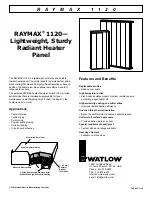
RESIDENTIAL GAS AND ELECTRIC WATER HEATER
SERVICE HANDBOOK
A.O. Smith Water Products Company
Technical Training Department
©
2005
Ashland City, TN
54
WHY WATER HEATER TANKS LEAK
WHAT WHY
PREVENTION
Water
Pressure
Water expands when it is heated
(Thermal Expansion). Water
cannot be compressed.
Excessive Pressure in the tank
causes failure of joints, welds or
gaskets.
A Temperature and Pressure Relief
Valve limits pressure to a
maximum.
Adding a Thermal Expansion Tank
limits pressure to near supply water
pressure.
Condensation
(Gas Water
Heaters)
Products of combustion contain
moisture. As the combustion
products cool the moisture
becomes liquid – carbonic acid.
The acid attacks the metal.
Higher efficiency water heaters
have cooler gases.
Recommended water storage
temperatures create cooler
surfaces.
Install a water heater with capacity
to minimize significant stored water
temperature drop during usage.
Store water at a higher temperature
– install a mixing valve to reduce
danger of scalding.
Contaminated
Air
Bleaches, floor waxes,
detergents, salt and many other
household products contain
chemicals which, when drawn into
contact with a flame (a gas water
heater uses 12 cubic feet of air for
each 1000 BTU of heat
generated). When these
chemical vapors or dusts come
into contact with a flame or
electrical contact, various acids
form. These acids attack the
metal.
Supply the heater with clean air.
“Direct Vent” water heaters use air
from outside of the building for
combustion.
Soft Water
Soft water minimizes mineral
buildup within the tank. Minimal
minerals maintain the water
heater at high efficiency but may
also expose interior surfaces to
corrosion. Mineral buildup in
some heaters prevents them
leaking while greatly reducing
efficiency.
A metal “Anode” rod within the tank
helps to prevent internal corrosion.
Maintain the self sacrificing “anode”
rod by inspecting the rod annually
and replacing when large “gouges”
appear in its surface.
Summary of Contents for TC-049R3
Page 69: ......















































